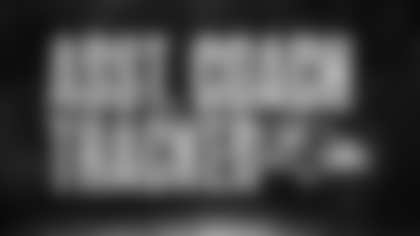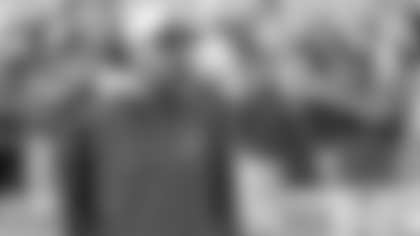RAVENS OFFSEASON WORKOUT AVAILABILITY
Strength & Conditioning coach bob rogucki, WR marlon brown, rb justin forsett, LB c.j. mosley, dt brandon williams
Strength and Conditioning Coach Bob Rogucki
Opening statement: "I was thinking … I think [senior vice president of public and community relations] Kevin [Byrne] wants me to stand still, but I won't be able to do that. It's amazing how over the years you find yourself … What year is this, [the] third year I'm doing this? Year No. 3. Well, listen, the first year I did this it was, 'Hey, what are you doing? I need you down here.' Next year, it was a little brief introduction earlier, then I came down. This year, where is it, on the web, streaming live? So, I want to thank all of you for giving me the opportunity to speak to you as a group, which has been announced. I had phone calls about this, which I'm a little surprised about. We're into the program. We have high fifties attending. This is our third day of running and lifting. Participation is good. Work is good. We've added a couple new pieces to the room. We try to bring something in every year just to add a change to what we do. Our method and philosophy stays the same, but if we don't bring something new in, there's going to be something out there that we're not aware of, players may find it, see it. We try to keep up with the trend that's out there, and that's just good business on our part. Our work habit is really dependent on them. People say, 'You have high numbers. You do a great job,' but believe me, we direct. One thing I can say about this program is the players that work in this program, they work very hard, and that is generated from within. They want to be successful. We're in a successful program here, and we continue to do that. But understand it's them. It's the players. That's the bottom line. It's the players with me on workout days; it's the players on Sunday out on the field. So, you really have to compliment them, and then you have to compliment the coaching staff. If you have a good staff that gets players where they need to be, directs them in the way they need to be directed, then you're going to be successful. So, players, coaches … And we're a small part of it, but we are a part of it. That's pretty much what our philosophy is, and we're going with this. Each week we pick up the intensity. Each week the weight will get heavier, the runs will get harder. Our objective is to prepare them for the first day of football school. We have them for two weeks. After two weeks, they go into football school, and then the coaches introduce what they want with them. Each one of those segments, we have to pick it up as we go closer to minicamp, preseason camp and so forth. You have any questions?"
With T Rick Wagner, CB Jimmy Smith, LB C.J. Mosley, what do you do to ease them back into it and what are some of the limitations in the things they can do at this point? (Aaron Wilson)"Some of those guys have been here since the end of the season, so we continue to train them. What we do in coordination with our athletic trainer, that's the first step – from the athletic trainer program and then on to our program. They're progressing very well. As far as their medical status, I can't say what that is other than they're progressing well, and it's a step-by-step, week-by-week process."
Injuries are always going to be part of the game. Last year it was well documented how many players ended up on IR. As a strength and conditioning staff and a medical staff, how much self-evaluation do you do after maybe a year like that to see, maybe, is there something lacking in the program, something that needs to be supplemented? How much of that evaluation do you guys do? (Luke Jones)"The evaluation occurs every year. Every year they come in [and] we do a screening process on them. As a rookie coming in or a player that has been here for eight years – like I've been here – every year there's an evaluation done on them, and we look at some things. And it seems to go in cycles. One year it may be the feet, one year it might be the knee. We have no control over that. The only thing we attempt to do is make sure we protect the shoulder capsule, the knee, the hip and so forth. But we do look at those areas and say, 'Is there something different we can do?' That basically starts with our physical therapy program then generates into our program. That's pretty much the answer to that. Once those injuries occur, we do look and say, 'Is there something more we can do, or is it just an accident that happened?' You really can't put a finger on it."
When you start a program with a player, how do you benchmark where he starts from to where you want him to go? (Kevin Richardson) "Over the last eight years, we've taken evaluation of every exercise that we do. And from that depending on what group they are in – middleweight, heavyweight or lightweight – each one of those three different, distinct areas will be using a certain amount of weight. With those three areas we add all the numbers together that we have on every exercise, and we come up with an average weight for the heavyweights, an average weight for the middleweights and an average for the lightweights. From the beginning when a rookie comes in – depending on what body part we're training – we take 75 percent of that weight for particular exercises or 85 percent. So, it's just a pinpoint guide. If you say, 'Compare this linebacker to your other linebacker,' well, just with the average weight and what normally we start linebackers out at, he's right on where he should be or he's weak in that area. The thing is we're not going to be strong in all areas. Everybody will have a weak area. You'll have a strong side of the body – left arm strong, right arm weak. And with that – if we find that weakness – we make sure we emphasize the weak side over the strong side, or if a body part is weak then that's when we go into the evaluation – like you said, 'What was your exercise that you do?' If we find that the back is weaker than the front, we will do some rehab or pre-exercises for the back area before we train that. It's just basically gathering numbers, finding them out in the group and then having a starting point. And [for] some of the guys, the weight is too light, some guys the weight is too heavy, and then we adjust it as we go. Make sense? OK."
Can you talk about the differences between a college program –even at the major colleges – compared to what you guys do here? (Mike Preston) "The number is the biggest difference. In a college program, the age of the kid, you have to look at that. As they go into the program, the main objective of that is to get that guy bigger as he progresses through the year, and it's really one program that you're generating. You're the collegiate weight coach [and say], 'This is what we do.' The battle that we have here in the National Football League is we might have 53 guys on a roster that are going through 53 different programs at a university, which they've had success at. What we try to do is incorporate No. 1 what they had success with, and No. 2 areas that are weak that we need to attack. They have a lot of input into what we do. I can't say because you were at this university and you came in as a first-round draft choice that everything you did was not correct. You got here by doing something. Probably genetics was the most important thing in getting here, but, still, you had success with what you did, so we listen to that. If a guy would prefer to use a bar over a dumbbell, we say, 'Fine.' Or if they want to use a machine over a bar, we say, 'Fine.' It doesn't matter what the tool is. Understand that's the misconception of strength training. People believe it is the tool that creates the result. It's not true. It's the method in which you use that tool. How effective is pounding a nail with the wooden part of the hammer? Is it an effective tool then? No. It's only effective when you hit it with the metal part. Because you have a bar or a dumbbell or a machine in your room, it doesn't mean one is better than the other. They all have advantages and disadvantages. So, [if] what you did at this university was successful for you, you can bring that into us. But, if that is something that may be dangerous for you as an athlete, then we say, 'We better substitute something for that.' The biggest difference is they're getting paid – at this level – a large sum of money. We have to protect that, we have to protect the interest of that player for the organization. It goes full circle. We will listen, we will try to understand what they may want to do, but still we have to guide them, because we all need guidance. It's a little bit easier at the collegiate program due to the fact that the main objective is to get them bigger and faster, and then they're going to hone in on that program, because they're not in a position to question. But when they get to this level, like I said, they've had success. Most of the time, they were successful since this high *(lowers hand near the ground) *and then you go back to how they were blessed with the genetic ability to be a great athlete. For the most part, these guys come in [and] they're already strong, they already have natural ability, they're already fast. They wouldn't be here if they weren't. The only thing we have to do is identify those areas that are weak. We tell our players … Most of the time, players are going to train what they see to the front. I see my chest to the front in a mirror. What about my back? What we try to do is get them to understand you have to have equal balance front and back. If you don't have equal balance, then you're going to run into problems. We'll find that from the upper body to the lower body. We just try to incorporate an entire program that encompasses the whole entire body in many different ways with many different variables [with] many different protocols. It's different on Monday after a game – our lifting program – than it is today. Why? Well, we're at 30,000 feet [on an airplane] coming back, we have a hyper-extended elbow and a broken finger. When that guy comes in on Monday, Tuesday or Wednesday to lift, guess what, everything has changed. What we did today we can't do then, because we have limitations due to the outcome of the game. We just have to adjust. That's how we have to be flexible."
Do you have a preference of free weight versus machine, your personal preference? (Mike Preston)"Use it all. I use it all. My preference is how am I going to get you to train? If you're going to work harder for me using a bar, then we're going to use a bar. If you're going to work harder using a dumbbell, then we're going to use a dumbbell. But understand each one of those components have an advantage and a disadvantage. When you're using a dumbbell you're concerned with what? Balancing the dumbbells, because you can't stay in a groove. Then are we in there to develop balance or are we in there to develop strength? Let's take it a step further. What about a machine that has a guide rod? Well, you don't have to worry about balance, but it's a straight lift. Now, that's a truest form of development or showing strength. You don't have to worry about balance, you don't have to worry about the synergistic muscle groups – it's just an example or demonstration of [strength]. Can you have a steady diet of that? No. Can you have a steady diet of dumbbells? No. Can you have a steady diet of the bar? No. What we do [is] we intermix them all. Within one routine we use a bar, a dumbbell and a machine across the board. And if some guys say, 'Hey, I know I'm supposed to be on the machine now, but I'd rather do a dumbbell, then we'll do a dumbbell.' Again, personal preference has a part in this. It's just like, what is your favorite golf club, or what are your favorite shoes? That's the same thing. Whatever you're the most comfortable with that you're going to work the hardest with, that's what we're going to lean towards. Unless areas of the body that there's only one way we can do that is by using that device, then that's what we have to do."
**Coach, what are some of the things that you do to evaluate where a player that was drafted is at strength and conditioning-wise? Is there any common thread as far as something that they need to improve [on] or something they might not be doing right? *(Turron Davenport) *"Well, that's hard to say. But let me just say this: The weak areas of the body are those areas to the backside of the body. Again, going back to my statement about what you see in the mirror you will train. A lot of the people that come into the program, they don't understand the shoulder capsule. That's a big concern of ours. We look at the shoulder capsule as bumpers on a car; they protect that capsule. We attack the shoulder probably more than most guys coming into our program, because of the vulnerability that is there every time they receive a blow on the field. The other area of concern is a lot of guys come into our program have never trained their neck. With the concussion aspect and all the things going into concussions, we have increased the number of exercises that we do for that area. We can't prevent them from happening, because they're going to happen, but if we can minimize the severity of those that do happen, that's what we're looking to do. We used to only do four movements for our neck; now we're doing six movements for our neck, which is a time consuming ordeal when you're talking about one body part, and it's the neck. That's the first thing we do coming into our program. We work four ways: we do a double shrug and a single shrug all with the concept of protecting the head if we can. How do we know? That [is a] weak area, the neck. The other weak area is the back of the shoulder, the other weak area is the hamstring, the other weak area is the low back. Again, they can attack those areas, but do they attack them properly? Again, we could do them many different ways. We can work the hamstrings by doing a bar RDL [Romanian Dead Lift], a dumbbell RDL, a glute-ham [raise] or a leg curl, and each one of those is incorporated into our aspect of that. We can take it even further – we can do a prone leg curl, we can do a seated leg curl, or we can do an independent leg curl. Within that framework, we're attacking every area with many different options."
Knowing that about the rookies that they have to come in and get used to the program, is there any bigger jump than the first year to the second year in terms of being in the program? (Jon Meoli) "Oh, yes. Yes, there's a big jump. There's a big jump from the time that they're here to when they return, because once they arrive here, it's very busy, and we're a small piece of the pie. We're just trying to introduce to them [a program], because they're here to play football. They have to learn offense, defense and special teams. We try to give them an introduction to let them know what areas they need to start looking at – again, going back to the neck, the shoulder, the hamstring, the low back if you haven't attacked those areas. Then from there when they return, they have an idea, because now the football is catching up to where they need to be. Right now when they first arrive, it's just basically survival for them, and we know that and they know that. So, it's just give them a little bit, a little bit and progress as we go."
How much focus do you put on nutrition with all that you do, and has that changed over the years? (Clifton Brown) "We have a full-time nutritious dietician on staff, so all that is directed towards her. Now, we do not do … Supplements, we do not recommend any supplements. We do nothing like that. If there's any question with the nutritional aspect, we send it to our nutritionist."
Bob, what do you do with a player who wants to do too much, the guy who's saying, "I want to come back this afternoon."? Do you have to slow him down? (Kevin Byrne) "See, probably one of the biggest disadvantageous of when you come into a program is that we lose the aspect. Sometimes they can overdue it and do too much. What we try to do is if they're going to do extra work, we try to get them to do it on the day that they've trained that body part. So, if they're going to … Say we did an upper-body movement today and they want to come back and do more, we say, 'All right, you can do limited to no more than maybe two more sets. But do not begin to do legs, because we have legs tomorrow.' So, the answer that question [is] if it's an upper-body day and they want to do extra on the upper, fine. But don't intermix with the lower, because we're going to attack the lower tomorrow, and that's when you run into problems of overtraining with that."
WR Marlon Brown
On how he feels he has grown as a receiver and if he feels this could be a big year for him: "I definitely think this can be a big year for me. I feel like I've grown just playing in the league for three years. If you do anything for an extended amount of time, you're going to obviously get better at it, and I feel like I've gotten better all around – blocking, catching, just being more consistent with my route-running. I'm just trying to get better."
On if he views this season as an opportunity to establish himself as a starter in the Ravens' offense, particularly with the departure of WR Torrey Smith:"For sure. It was real hard for me, because he was close [to me]. He was like my big brother on and off the field, he taught me so much. But I know I was talking to him and he was just telling me, 'You're young, but your time is going to come.' Now it's here, so I feel like I've just got to capitalize on my opportunity."
On if he feels like this is his time to step up:"Yes, I feel like it's our time as a receiving corps to prove to the world that we're here, that we can play. Me, Kamar [Aiken], Mike [Campanaro], J.B. [Jeremy Butler], I feel like all of us are like, 'It's our time.'"
On his early impressions of offensive coordinator Marc Trestman and what he can bring to the offense:"He's so excited and so detailed about the offense. I like that he's breaking it down so that everybody as a whole team can understand the aspects of the offense and everything. So, I'm loving him."
On if he expects a lot of changes to the offense from last year:"There' been a couple of changes, just about little linemen issues, verbiage maybe, but other than that, everything is pretty much the same."
On if he sees an opportunity to play more in the slot after seeing the way Trestman used some of his big-bodied receivers in Chicago:"Oh, yes. For the past couple of years I've been playing a slot position, but I know once they said Trestman was coming in, I definitely got excited, because he loves to throw the ball to guys in the slot and to guys on the outside. So, I was excited."
On how he would evaluate last season for himself after having an impactful rookie season:"Steve Smith [Sr.] came in!! *(laughter) *I had no problem with that, Steve came in – I mean he's a future Hall of Famer – I had no beef, no problem with Steve. Steve helped me out a lot, even from my time, so I felt like last year I was always grinding and working hard, and I felt like at the end of the year it showed."
On if he felt like the forgotten man a little bit at the beginning:"I didn't feel like I was forgotten or anything. I mean, Steve Smith [Sr.] was on the team!! (laughter) *It's Steve Smith [Sr.]. I had no problem; it was all good. It's the coaches' decision and I'm very coachable, so if coach tells me, 'Steve is going to come in and do this,' hey, it's all good. *I'm a team guy. Small me, big team."
On what he learned from Steve Smith Sr. joining the team:"Man, I was taking notes. I had my pen out, my pad, I was taking notes. Because I knew – like you all said – the time was going to come, and once the time came I had to be ready. Last year I was trying to get ready and play, and now I feel like the time is here, so I've just got to prove myself."
On if he's been able to pick the brain of his receivers coach Bobby Engram:"For sure. But you know, I'm tall, Bobby is short, but at the end of the day I've definitely picked his brain a lot about anything. Any football play – outside receiver or slot receiver."
On if he's watched any of Engram's game film:"He hasn't showed us any of his film yet, but I definitely Googled him and was trying to find some. I haven't found any yet, but if you all want to send me some, send it to me." (laughter)
On if the young group of wide receivers rally around each other after listening to media reports that the team should draft a receiver early:"Guys in our room, we don't really pay too much attention to the draft, because it's just not really up to us. We don't have a say in who we pick, so I just feel like the guys in our room, we're just going to keep getting better and just keep grinding and just keep showing the coaches that we've got some guys here, too. We have no say in [the draft choices]."
RB Justin Forsett
On his goals for the offseason workout program: "I just want to get stronger, faster. I just want to build upon last season."
On why it is important for him to be here during this time:"I want to be around the guys, working out, building some camaraderie. And with the new offensive coordinator, with coach [Marc] Trestman, I want to make sure I'm getting the terminology down, any switches or any changes that we have, I want to be able to have it so it's a smooth transition."
On when he can receive his playbook as far as the things Marc Trestman will put in:"We were able to have some football talks, see some of the terminology differences that we had last year, go over some of the run stuff that we're keeping. So, it's been good."
On if it encourages him to see how Trestman used Bears RB Matt Forte in Chicago for their offensive scheme:"Definitely, I'm excited. He got an opportunity to touch the ball a lot of times, whether it's running the ball or catching the ball. So, anytime I can get my hands on it, I'm excited."
On how he would feel about the Ravens drafting another running back:"My job is to go out and produce and make plays and have an impact. If they bring someone else in, [I'll] just go in and compete and work hard."
On if he enjoys the role of mentoring younger players:"I've been in the game going on my eighth season, so even with the guys here, being a leader, being able to mentor those guys, help them on and off the field, I feel that's what I'm here for."
On how nice it is to come back to the same team this season:"It's nice to have a season where I'm able to come back to the same city and not have to move or call the moving company. It's nice; I'm really enjoying it."
On what he thinks about the 2015 schedule:"I like it, I like it. First checking out where the bye week is, making sure that's right. *(laughter) *Then primetime games are always exciting, so I think we've got five of them if I'm not [mistaken]. Being able to play [under] the lights and in front of the country, it's going to be nice."
On RB Lorenzo Taliaferro and what kind of natural jump a player usually makes from his first year in the NFL to his second:"It's big. You just feel more comfortable, you know what to expect. He's got a lot of playing time under his belt for a second-year guy, so I'm excited to see his jump and I think we've got a good, stable backfield here."
On what he's seen from WR Marlon Brown's development:"Marlon is a tough guy, man. He's not like your ordinary receiver. He'll go down, make nice catches, one-handed grabs, but then you'll see him running down on special teams and trying to take somebody's head off. He's one of those guys that's an all-around player. He can block, catch, do it all."* *
LB C.J. Mosley
On how his wrist is progressing and if he is able to lift weights: "I can't really do anything with my wrist. I'm doing free body weights right now. Everything is progressing, so [I am] not having any major setbacks so far. [I am] just getting back into it with the workouts and everything."
On if he will be able to participate in practices this spring: "I'll probably do everything that I can. I don't know how much physical stuff I can do, but I'm going to be on the field, definitely."
On what his life was life a year ago prior to the draft and how far he has come: "Around this time, I was probably still visiting some teams. I might have been here [in Baltimore] around this time, because I know I came and visited in April last year. I [was] just trying to present the best person I could be at this time last year. I'm not trying to think about that, because that was a long, struggling process."
On how he made a good impression with the Ravens organization prior to the draft: "Just being the person I am now. I stay humble, I stay true to them, and pretty much I let my play do the talking on the field. I probably didn't have too much to say talking-wise. I'm pretty sure they can tell you about that, but I just told them what kind of person I was, and I know everybody at Alabama had good things to say about me. I just tried to be me."
On how it was a long year transitioning from college to the NFL: "Definitely, but things turned out well. It didn't end the way we wanted to, but as a player, I had a great year. [I am] just ready to be back and glad everybody is here to get ready to work again."
On whether it was a big deal not to be named Defensive Rookie of the Year: "At the end of the day – as far as accolades – I wanted that award, but Aaron Donald, he earned it. We went up together, I think, for three awards coming out of college, and he got all three of them. One day, I'm going to beat him for an award. (laughter) But, I was happy for him."
On having time off after the season was over: "It was great. I went back to Tuscaloosa, hung out. I saw my brother, because he's at Alabama now as a freshman. I went and saw some family in Chicago, because I haven't been there in a while just because I've been so busy. It was good to see family and relax."
On how different an NFL offseason is compared to college: "I guess I'll say the timeframe, because at Alabama we get a few weeks off after the bowl game and then we come back and start our fourth quarter program. That's just conditioning and working out, so they started maybe two months ago and we're just now getting back started. So, those extra months definitely paid off."
On where he wants to improve in his second year: "Learning the little things about the defense, definitely. Definitely getting back stronger after I get this cast off and still learning from my vets, because there are still a lot of things to learn as far as [being a] defensive player, being a young player. Getting in touch with Daryl Smith more and seeing the things that helped him progress each year in his long career, that can help me out."
On whether there is extra motivation after seeing CB Jimmy Smith receive a contract extension: "As long as I'm producing and staying out of trouble off the field, on the field, doing the right things … If you're doing those things in a period of time through that first contract, your play and your actions on and off the field are going to speak for itself. This is a great organization, and I know if I'm doing the right thing, I'll definitely try to be here for that second contract."
On the key to staying out of trouble off the field: "I guess for me [it is] not getting in with the wrong crowd. That was kind of my way of staying out of trouble – keeping my circle close, keeping the same friends I had, listen to my parents when they tell me to do things the right way and being the humble guy that I've always been. It hasn't been that hard for me, so I'm going to try to keep it that way."
On whether he has had a surge of new friends since entering the NFL: "No. So far I'm still good. I'm going to try to keep it that way."
On his reaction to the Ravens' 2015 regular season schedule: "It is what it is. I'm excited to play some new teams and go to new places. But besides that, we're going to prepare like we've been doing – or like we did last year – and try to win as many games as we can so we can get back to what we did last year."
On how he has adjusted to living Baltimore: "I think I got lucky for my first year. It wasn't – as far as football games – it wasn't that cold. It snowed a few times in practices. But definitely after I left to go back home in January and February, it definitely snowed way more than I probably wanted it to. When I first got here, the first thing that caught my eye was like it is outside right now – it was very, very green, a lot of hills and everything, so it reminded me of back home in the South. You hear Baltimore, you hear city and you think all you're going to see is buildings here and there. But, I feel very at home being out here in Owings Mills."
On what he improved upon during last season: "I'd say learn every day. Pretty much the saying is, 'If you don't get better, you get worse.' Whether that was getting better in the weight room, learning defense more, communicating more, I tried to do everything I could learning from the vets. If I made a mistake on the play, we go back and watch the film [and] try to correct it. I just did what I had to do as a football player to make good plays."
On if there was anything he has to improve upon in his training coming out of college: "Not too much. For the most part, the weights that we lift are kind of different from Alabama, because we do more with the bars, and here with at the Ravens it's more free weight. That helps out a lot, especially because I had two shoulder surgeries, so some things it's kind of hard for me to do, especially with heavy weights. They set the workouts for how your body is, so that helped me a lot just letting me get stronger and isolating certain muscles and things like that."
On what the buildup to the draft is like: "It's probably different for different guys. I'm a laidback guy, so I had a bunch of my family with me in New York last year. I was pretty comfortable for the most part. The day of the draft it kind of goes by fast, but when you're in that green room it takes a long time. I was drafted 17th and that took two hours. It's a fun process, but guys just have to relax, because all their work paid off. Whether [it is] the first, second, whatever it is, they're going to get what they deserve."
DT Brandon Williams
On if the offseason weightlifting program is one of his favorite times of the year: "Weightlifting is great. I love working out, but mostly just coming here seeing the guys after a long time apart, back with your brothers, back with your family. That's pretty much the thing I look forward to – seeing the coaches and hanging out, cracking jokes and stuff like that."
On the Ravens trading DT Haloti Ngata to the Detroit Lions: "It was surprising, but at the same time, you get the opportunity to step up and show what you're actually capable of. I love Haloti, great guy, wish him the best in Detroit. But at the same time, we're in Baltimore right now. The show must go on, so someone else has to step up."
On whether he is ready to play without DT Haloti Nagata: "Yes, I'm definitely ready. I felt I proved last year when we were playing next to each other that I was ready. The only difference is next to me will probably be Timmy Jernigan instead of Haloti. That's about it."
On whether he feels if DT Timmy Jernigan is ready for a starting role: "Oh, definitely. I feel like he's definitely ready. I call him a little pit bull, because he never stops. He might be a little smaller than Haloti … I mean, I lot smaller. Not a lot of people are as big as Haloti, but he still gives it his all, 100 percent every single time, and he never quits. He's definitely ready."
On how critical it was for DT Timmy Jernigan to fill in last season during DT Haloti Nagata's suspension: "It was good, because it got us ready for this point right here. Haloti is not here, so he's going to have to step up. Someone is going to have to step up, whoever it is. And we still had a great defensive line when Haloti [was] away, so it was fine."
On what allows him to play a high amount of snaps with such intensity: "Just getting back and healing – treating your body right, putting the right foods in and stretching and getting massages. Do whatever you need to get done when you're off the field to get you ready for that Sunday and to continue your high level of play during the game."
On what it is like coming from a D-II school to the NFL and the differences in the weight room: "A weight room is a weight room no matter where you are. As long as they have weights, you can get what you need done. There [are] just a lot more [weights] here. Coming from D-II – a small scale – to this huge ... [It is] not like I came from Alabama where I got more weight rooms [than] probably any NFL players. It's just a weight room. As long as you have the hard work and dedication, you can get anything done wherever you are."
On the Ravens' 2015 regular season schedule: "Let's play ball. It's a game, so no matter where it is, we're going to play as hard as we can."
On his draft experience and how he made a good impression with the Ravens: "I would say the handstands. (laugher) No, just my ability, how big I am, but also how quick my feet are. And just being myself, not trying to be anyone else, not trying to sugarcoat things, just being who I am. Telling the truth and say, 'Hey, this is me, and if you like me, take me. And if not, see you when I play you.' That's kind of how I went at it. You're going to get me no matter what. I'm always going to be the same person. I'm not going to change."
On what draft day was like for him: "It was so many different emotions that day, because when I got picked, it was the third round. It was the second day, but it was close to the end, so I was like, 'Oh man, I hope I don't have to tell people to come back tomorrow.' *(laughter) *Once it got toward the end of the third round, it was just a nail biter, and then I got that phone call and all the weight just got lifted off my shoulders. I was just happy as can be. It was amazing. But before that, it was just anxiety. The pool wasn't open yet, but I jumped in it, because I was just nervous. I went hunting for a little bit shooting beer bottles and all that stuff kind of to relax and hang out. But other than that, it was just a great feeling to get picked."
On whether he thought the Ravens would draft him: "They were definitely at my school a lot. When you see who comes to your school, you try to narrow it down in your head, try to figure out where you're going to go. Me seeing the same guy over and over every few weeks or so, it was just like, 'I see this guy and I see this guy and I see this guy, so here's my Top 3, I think.' [Midwest area scout] Jack Glowik was the guy who I saw – he was the scout that I saw mostly – and from there on, I knew I was thinking about going [to] these places. But you never know until your name gets called."
On whether he thought he would be overlooked at a small school: "You never know. You can be the best ever and then get picked [in a] later round. It's just the luck of the draw and how much they like you or how much they want you or how much they see in you as a player and a person. I feel like I did the right things to get picked when I needed to be, especially coming from a D-II school. I knew I had to give it my all. I had to [give it my all] at D-II, so I could be up there with the guys – the pro-type players in D-I – [is] what they told me, and here I am."
On the benefits of starting in his second year versus first: "It worked for me to feel the play. But also the year when I was not really playing that much definitely helped me the most, because I was around the plays a lot more, and I was focusing a lot more on just knowing the plays. Then once my second year came, and I had that starting role, I felt a lot more comfortable in how I play, what calls were going to be made. And I knew more of not what kind of play it was, but more of what can they do to me in this play. So, I was not thinking about what should I do, but what they can do to me."

















